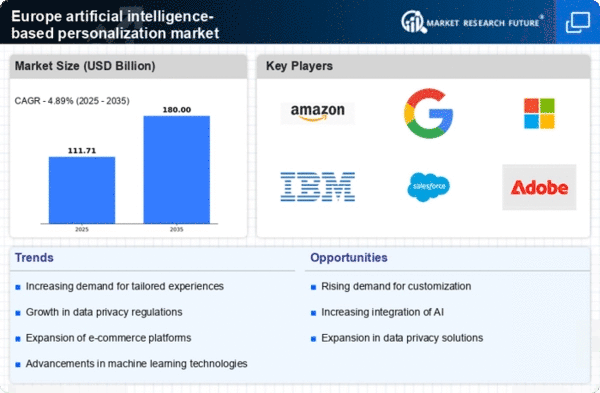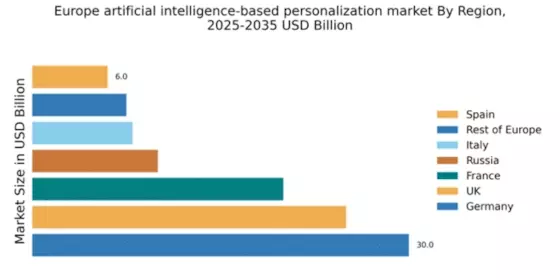Germany : Strong Market Growth and Innovation
Germany holds a commanding 30.0% market share in the AI-based personalization sector, valued at approximately €3 billion. Key growth drivers include a robust tech infrastructure, significant investments in R&D, and a strong focus on data privacy regulations. The demand for personalized customer experiences is surging, driven by e-commerce and digital marketing trends. Government initiatives, such as the Digital Strategy 2025, are fostering innovation and supporting startups in the AI space.
UK : Innovation and Consumer Demand Surge
The UK commands a 25.0% market share in the AI personalization market, valued at around €2.5 billion. Growth is fueled by high consumer demand for personalized services, particularly in retail and finance. The UK government has introduced initiatives like the AI Sector Deal to enhance AI capabilities. The competitive landscape is vibrant, with London emerging as a tech hub, attracting major players like Google and Microsoft, alongside numerous startups focusing on niche applications.
France : Strong Government Support and Investment
France holds a 20.0% market share in the AI personalization market, valued at approximately €2 billion. The growth is driven by government initiatives such as the AI for Humanity strategy, which promotes AI research and development. The demand for personalized content in sectors like e-commerce and entertainment is rising. Paris is a key market, hosting major players like IBM and local startups, creating a competitive environment that fosters innovation and collaboration.
Russia : Investment and Infrastructure Development
Russia accounts for a 10.0% market share in the AI personalization market, valued at about €1 billion. Key growth drivers include increased investment in technology and a growing digital economy. The government is promoting AI through initiatives like the National Strategy for AI Development. Moscow and St. Petersburg are key markets, with a mix of local and international players like SAP and Oracle competing for market share, particularly in finance and telecommunications.
Italy : Cultural and Market Adaptation Focus
Italy captures an 8.0% market share in the AI personalization market, valued at approximately €800 million. Growth is driven by the increasing adoption of AI in retail and tourism sectors. The Italian government is supporting AI initiatives through funding and regulatory frameworks. Key markets include Milan and Rome, where major players like Salesforce and Adobe are establishing a presence, focusing on enhancing customer experiences through tailored solutions.
Spain : Evolving Market with Local Players
Spain holds a 6.0% market share in the AI personalization market, valued at around €600 million. The growth is supported by rising consumer expectations for personalized services, particularly in e-commerce and travel. The Spanish government is fostering AI development through initiatives like the Spanish Strategy for AI. Key markets include Madrid and Barcelona, where local startups and international players like Amazon are competing to capture market share.
Rest of Europe : Varied Growth Across Regions
The Rest of Europe accounts for a 7.5% market share in the AI personalization market, valued at approximately €750 million. Growth drivers vary by country, with some focusing on regulatory frameworks while others emphasize technological adoption. Countries like the Netherlands and Sweden are emerging as key players, with a mix of local and international companies. The competitive landscape is diverse, with a focus on sector-specific applications in finance, healthcare, and retail.


















